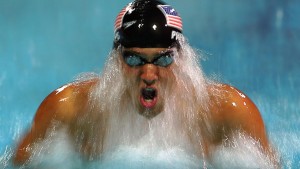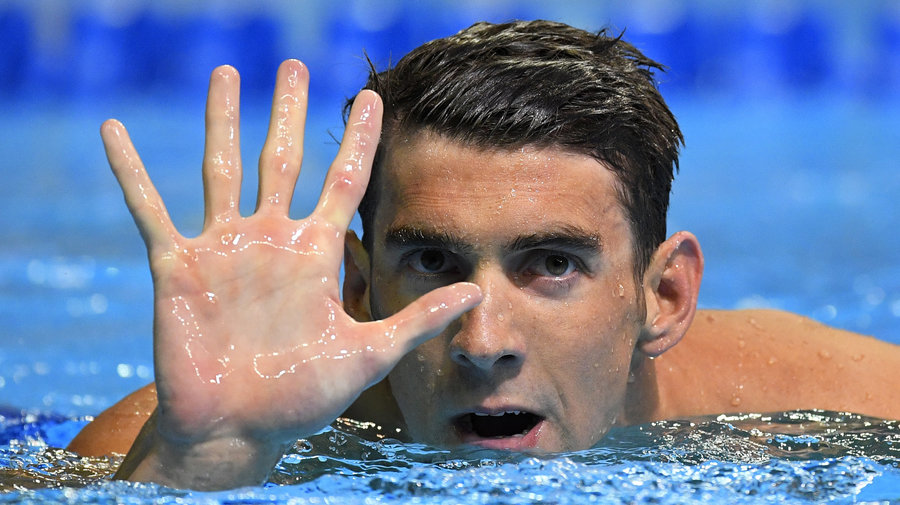U.S. swimmer Michael Phelps won his 23rd gold medal this week during the 400-meter medley relay at the Olympic Games in Rio de Janeiro. The following article was originally published by “Scientific American” following Phelps’s successful performance at the 2008 Games in Beijing.

Now that Michael Phelps has won an unmatched eight gold medals in this year’s Olympic Games, lots of journalists are asking what gives Phelps such a leg up on the competition (legally, of course, though allegations of doping have tainted other Beijing Olympians). Beyond Phelps’ drive to succeed, as reported by the Australian Broadcasting Company, and his undoubtedly good training, could it be that a good bit of his (as well as many athletes’) talent just boils down to simple anatomy?
There’s his proportionally longer “wingspan,” as described by the Toronto Sun newspaper. Phelps’s arms extend 80 inches (203 centimeters) tip to tip, and his body measures in at 76 inches (193 centimeters) in height. Most of the time, a person’s height normally corresponds closely to the distance between his outstretched hands. (Recall Leonardo da Vinci’sVitruvian Man, that famous sketch of a naked male showing his arm-leg-torso ratios.) Maybe this extra reach gave Phelps that narrowest of victories against Serbia’s Milo Cavic in the 100-meter butterfly final on Saturday, August 16, when the American won by just one one-hundredth of a second.
Phelps is also said to be double-jointed, according to a Detroit News blog. His size-14 feet reportedly bend 15 degrees farther at the ankle than most other swimmers, turning his feet into virtual flippers. This flexibility also extends to his knees and elbows, possibly allowing him to get more out of each stroke.
Do any of these alleged anatomical advantages matter? To find out, ScientificAmerican.com spoke to H. Richard Weiner, an internist and former team physician who has practiced sports medicine at the University of Wisconsin–Milwaukee —and who also happens to be a former acclaimed All-American swimmer.

An edited transcript of the interview follows.
What do you think about the notions about Phelps’s built-in, anatomical advantages?
When someone does something statistically impressive, like winning eight gold medals like Phelps, we try to come up with some far-fetched reason for it, like he or she has to have some bizarre physiological adaptation or freaky anatomy. But most things that you measure in human beings fall within predictable ranges.
What do you think about the “wingspan” argument—that Phelps’s long arms give him an edge?
All things being equal, a taller person [with longer arms than a shorter person] will swim faster. A lot of the thrust in swimming comes from arm propulsion and not the kick. But then again, the person who won [the men’s 100- and 200-meter] breaststroke is a five-foot, eight- [1.78-meter-] tall Japanese man [named Kosuke Kitajima]. Matt Grevers, a U.S. swimmer from Northwestern University [in Illinois], is six foot, eight [2.03 meters]. I stood next to him and his arms are, heaven knows, more proportional to a guy who is seven feet [2.13 meters] tall. When he does [the] backstroke and you’re standing on deck, it looks like a tree is coming out of the water. And [Grevers] has done well, but not as well as Phelps. So height in and of itself does not intrinsically confer success.
What about bodily ratios, as in the length of one’s legs compared to torso size, and so forth—any advantage there?
So we’ve been hearing how Phelps has a long torso with shorter-than-expected legs and how that gives him a powerful push when he turns off the wall. There’s a problem here: If two fellows of [the] same height are trying to turn [off the wall after a lap in the pool], the guy with the longer legs will hit the wall from farther away and should also have the better kick going back the other way.
What about the claim that Phelps’s ankles can bend more than other people’s ankles?
It’s true that more supple joints do give you an advantage, and so that’s why stretching helps athletes out a great deal. But I’m not satisfied that Phelps has more flexibility than the other guys swimming in his events. Yes, compared to the average 23-year-old walking down the street, Phelps probably is more flexible that they are, but he’s also in far better shape. If he has some pronounced laxity in his ankles, he is not likely to be that much more flexible [than his competitors].
As for double-jointedness…?
Having elbows and wrists that bend easily should not be an advantage, mechanically speaking. If you put force through a joint that is unstable, you are in danger of hurting the joint. His joints may be somewhat looser, but that could put him at a disadvantage in the weight room.
Another specious claim is that there’s been some talk about him being able to utilize oxygen better than other people. Not having been to [Phelps’] autopsy, I think that’s rather hard to say at this point.
What do you think accounts for Phelps’s success then?
[Phelps] has very good stroke mechanics—that certainly goes a long way. Some people also have better [so-called] “locomotive genius”—this is when swimmers have that sense of moving the water around them and how much water they are displacing. By analogy, think of someone who is stroking a backhand in tennis who just seems to know better [than other tennis players] where the ball will go. Mark Spitz [the swimmer who won seven gold medals in the 1972 Munich Olympics] was claimed to have anatomical advantages. [Spitz] and I swam the same events, though he did them a whole lot quicker. But it was not like he had six fingers. Almost everyone who has success [in sports] is said to have some unusual property, though I have not seen this borne out.
You can compare it to the Ted Williams [urban legend in baseball]—they say he could see the stitching on the ball [of the incoming pitch] rotate, and that he would know by the rotation whether he was getting a fastball or a curveball. I’m inclined to be a little bit skeptical of that. It is the same as saying people have some special intellectual gift. Why is it these people tend to be the ones to close down the libraries and study all the time? Tiger Woods probably was not born being able to hit a ball 250 yards in a straight line, but hundreds of buckets of balls later, he developed such a skill.
Why do you think these ideas of physiological advantage are often repeated?
I guess it’s hard for people just to believe that it can just be stroke mechanics for Phelps or any other swimmer. Unless a seemingly suitable explanation comes up, people then think that this individual must be cheating or doping. It couldn’t just be that the guy trained his guts out. Look at what happened to Lance Armstrong—he won seven [Tour de Frances] in a row, [was accused of cheating], and yet [authorities] haven’t found anything. (Update 8/15/2016: In October 2012, Lance Armstrong was stripped of his seven Tour de France titles and banned from Olympic sports following a 202-page report from the U.S. Anti-Doping Agency that concluded he cheated throughout his career.)
So do you think there is anything to these “natural physical gift” arguments?
I’m sure if we could measure Phelps as much as we would like, we would find attributes better than average for swimming, but I don’t think we would find any glaring abnormalities. I suspected if we could comprehensively measure all Olympians in finals, we would see significant differences [when compared to non-Olympians], but we would not see them having freakish things like 200 percent more lung capacity, or muscles that can contract at twice the [maximum] force of a normal human muscle. I mean, come on.

